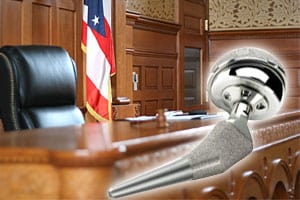
The head of marketing at DePuy Orthopaedics assured one of his subordinates who expressed concerns over the safety of the company’s ASR metal-on-metal hip implant that the company was on top of the matter and the product he was pitching was safe. In fact, Randall Kilburn did such a good job of convincing then-hip implant […]
 The head of marketing at DePuy Orthopaedics assured one of his subordinates who expressed concerns over the safety of the company’s ASR metal-on-metal hip implant that the company was on top of the matter and the product he was pitching was safe.
The head of marketing at DePuy Orthopaedics assured one of his subordinates who expressed concerns over the safety of the company’s ASR metal-on-metal hip implant that the company was on top of the matter and the product he was pitching was safe.
In fact, Randall Kilburn did such a good job of convincing then-hip implant marketing rep Paul Berman that the ASR metal-on-metal hip implant was safe that Berman told him that he “was comfortable that all his input was heard and that the product was safe.” This declaration came in March 2010, five months before the company would eventually issue a global recall on the device, citing disappointing “clinical standards” established during its time on the market.
According to a Bloomberg report this week from the ongoing trial against DePuy and its allegedly defective hip implant in Los Angeles Superior Court, Kilburn testified on Wednesday and told jurors that he stood by every decision the company made during the ASR hip implant’s time on the market. The company is accused of conspiring to hide data and admit that it had no knowledge that the ASR metal-on-metal hip implant was largely defective and causing thousands of recipients to experience severe pain and ultimately resort to revision surgeries to remove the device after just a few months or years.
The ASR was touted like all other metal-on-metal hip implants as more durable and longer-lasting that previous models of hip implants. This led to more than 90,000 ASR hip implants being sold in the U.S. and abroad between 2003 and its recall in August 2010. The implant was available in the U.S. since 2005, when it was approved by the Food and Drug Administration.
Berman, who previously testified in this case, contacted Kilburn to express his continuing frustration and worry that he was pitching a defective hip implant. He said in an email addressed to Kilburn, that was eventually shared with then-DePuy President David Floyd, he had “an obligation” to express his concern as an employee of the company, namely regarding the growing reports of complications among ASR hip implant recipients.
During its time on the market, more and more recipients began experiencing a wide range of complications that were clearly linked to the hip implant. Severe pain and inflammation, caused by and resulting from a loosening of the implant, combined with accumulating metallic ions caused by the coming together of the all-metal components of the device, forced many recipients to undergo unexpected medical treatments and eventual revision surgeries to remove the devices.
Previously at this trial, entering its third week on Friday, surgeons who implanted several hundred of these devices have shared their experiences with the DePuy ASR hip with jurors. One surgeon said he’s experienced an early failure rate at about 40 percent.
Berman told Kilburn that he had emailed four times over the course of several years regarding his concerns with the device to other executives. In response, Kilburn said, “I know that our processes are very robust. People are free to raise concerns. We have that open dialogue and debate. Our senior leaders have the best interests of patients in mind,” according to the Bloomberg report.
Lawyers for Loren Kransky, a former Montana prison guard, are out to prove that executives like Kilburn were aware of the problems plaguing its top-selling ASR hip implant but ignored them as sales increased. One-by-one, former and current executives of the company have taken the stand and said they shared concerns with those in charge at DePuy, a division of Johnson & Johnson, but those who’ve recently been called to testify, like Kilburn, said they stand behind the company line that the ASR hip implant is safe and not defective.


